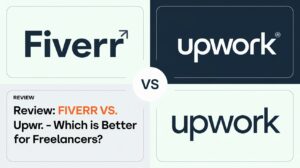Make Money from Home with Apps: Easy Steps for Earning Income | Topictre
In today’s modern world of work, freelancers have never had greater access to work and the potential to develop their businesses. There are quite several platforms where freelancers find work and some of the most well-known are Fiverr and Upwork. Although they are both sites that simply connect freelancers with clients, they function in vastly different ways and serve two different purposes.
This post is designed to help you compare and determine which of the two platforms is better suited for your freelancing business: Fiverr and Upwork.
Fiverr and Upwork Compared
Now, let me begin with a brief overview of what Fiverr and Upwork are in case you don’t know them well.
Fiverr:
Founded in February 2010, Fiverr is an online marketplace where ‘sellers’ provide various services known as ‘gigs’ for a minimum fee of $5, although it is possible to offer higher-priced services as well. Fiverr provides freelancers with several fields ranging from graphic designing to writing, to marketing, and many more to tech support.
Upwork:
Launched in 2015 as a merged company known as Elance-oDesk, Upwork is one of the biggest freelance marketplaces. It matches freelancers with clients – who it calls Buyers – for work that might be done in a few hours, to a few weeks or months, or maybe even years. Upwork caters to multiple categories such as technology, arts and design, writing, marketing, and so on.

1. Ease of Use
Fiverr:
It becomes easy to handle Fiverr’s platform since it lacks any complicated interface. Entrepreneurs find it flexible to list their profile, list the type of services they offer, and get down to business. The process is straightforward: you introduce your gig, state the amount you wish to earn per job and then await order from clients. Fiverr’s in-site search is also intuitive – thus enabling clients to easily search for specific services.
Upwork:
Upwork is categorized as more complicated than Fiverr since it has more features and tools in its platform. To acquire freelance work, one has to develop a profile of their skills, experience, and previous work. To get jobs, freelancers must apply for the postings which entails creating a proposal for the job, writing a cover letter, and sometimes responding to other questions. The Upwork website seems somewhat difficult to navigate in terms of its menus but it provides more freedom in its opportunities and in choosing the specific projects to accept.
Verdict:
Fiverr can be said to be more simple and easy to operate compared to Upwork, especially for freelancers getting into the market. Upwork has a slightly more complicated registration process as a result of its focus on the freelancer’s specialization, but it offers more freedom in choosing assignments.
2. Pricing and Fees
Fiverr:
The pricing structure of Fiverr – unlike many other freelancing platforms – is very straightforward. You should determine the costs of the gigs you offer and pocket 80 percent of the amount charged as Fiverr only takes 20 percent commission from every sale. As for the cons, there is no limit to customers but be aware that Fiverr costs money to process payments. For instance, if you offer a gig at $100, you will get only $80 since Fiverr will take its commission.
Upwork:
Upwork also has a policy whereby they take 20% of your charges but this fee reduces with increased earnings from a client. For the first $500 of the billed amount, Upwork’s cut is 20%. For the amount ranging from $500 to $1000, the fee is reduced to 10 percent. Sole traders and small businesses who submit claims up to $1,000 have 100% of the amounts paid reimbursed; those who submit bills from $1,001 to $10,000 get 90% of the bill reimbursed but submitters for bills over $10,000 are only reimbursed 5%. Upwork also takes a fee of ‘Connects’ from freelancers to apply for the projects that have been posted by employers.
Verdict:
While Upwork has a complicated pricing system that charges a fee on each contract, Fiverr’s pricing is much simpler and cheaper in the long run when you develop a business with your clients.
3. Project Types and Flexibility
Fiverr:
Due to these factors, Fiverr is perfect for providing exclusive, and clearly outlined services. If you are designing an icon, creating a blog post, or cutting out a piece of a video, Fiverr’s gig-based system can be effective for those who like to work on fairly straightforward one-time projects. Even though Fiverr has introduced features such as ‘Custom Offers’ for all those freelancers who want to work more flexibly or on less rope and fork projects, the platform is best for freelancers who have to sell a separate and distinctive service.
Upwork:
Upwork is more flexible compared to Fiverr with regards to the kind of jobs to be undertaken. Unlike specialized platforms, Upwork offers an opportunity to search through short-term projects, long-term contracts, and even remote full-time jobs. It is available for anyone interested in working for some time on different projects, but mostly freelancers can offer their services for jobs they are interested in, which makes it perfect for those who can work with clients for an extended period and those who work on various, more complicated assignments.
Verdict:
Fiverr is best suited if you are in search of work with clear deliverables as pertains to a project-based style of employment. Hence when it comes to more complex, different, or long-term engagements, Upwork is more suitable.
4. Client Interaction and Communication
Fiverr:
At Fiverr, most of the interactions with the clients occur after the particular gig has been acquired. This means that freelancers come across a few potential clients with whom they can work before the client places an order. Unfortunately, Fiverr does provide for messaging but communication is usually limited to basic exchanges or when the client in question initiates a conversation prior to purchasing any gig. It is convenient for fast work which is in a simple ‘teller’ mode, but when dealing with creative projects, it suppresses one’s desire.
Upwork:
For advertisers, Upwork permits additional, broader producer-customer connections. Freelancers present their bids to employers and communicate with them before they are hired by the employer. This makes it possible to gauge the client’s needs and their expectations as long as they seek services from the firm. It is more beneficial for intricate or extended projects since the platform of Upwork is compliant with video calls as well as file sharing and also a range of details corresponding.
Verdict:
Upwork is more suitable for a project that has many strict requirements for the interaction with the client. Fiverr is a lot more organized but does not allow any communication before the purchase.

5. Earning Potential
Fiverr:
The earnings of an individual at Fiverr highly depend on the gig posted as well as the promotion skills the seller has. Due to the creation of the platform, many freelancers ventured into offering their services at shallow prices but in present, most of them demand high rates for quality work. But gaining the audience’s approval and all ‘the cracks’ in the competition can lead to years.
Upwork:
Still, Upwork is usually more rewarding, particularly for veterans in the freelancing market. Since you control the prices in the platform and can bid on high-priced projects, Upwork is the best platform for earning a good income. Having a well-developed profile and receiving high rankings will allow for large-scale contracts as you go through the levels and increase the number of clients who do not mind paying commissions for their services.
Verdict:
Upwork in general can be more profitable for a freelancer because they can earn much more on this platform and they can charge their clients higher fees if they are experienced freelancers. That is why Fiverr can also be very profitable but it may be harder to stand out and get well-paid customers.
6. Competition and Visibility
Fiverr:
It is very crowded with millions of gigs listing across various categories on Fiverr. Newcomers to such markets may not get proper recognition due to the stiff competition they are likely to encounter. But for a while, Fiverr’s algorithm does rank the gigs based on ratings, reviews, and sales so it means that providing quality services and attracting buyers’ attention can skyrocket your sales.
Upwork:
Upwork also comes to be rather competitive due to its freedom in usage as well as the proposal system, which lets the freelancers sell themselves. This can be an advantage particularly when you are endowed with excellent communication skills and in a position to create propositions out of you. It can be competitive to have a chance to win such bids against other freelancers who have been working for a long time and even have samples of similar work and positive feedback.
Verdict:
Both platforms are quite similar, and if compared the service reign looks more versatile as it allows for custom proposals. Fiverr mainly relies on user promotion of the gigs and acquiring favorable reviews and ratings.
Final Thoughts: Which Is Better for Freelancers?
Like in any decision between two platforms, it depends on what one wants, their specialty, and their preferences between Fiverr and Upwork when choosing between the two.
Use Fiverr in case you are fine with specialized, clearly outlined services, like the concept of gigs, and eager to start as soon as possible, not writing proposals.
Select Upwork if you seek a variety of tasks, need stable clients, and do not mind composing proposals and bargaining over the price.
At the same time, it is necessary to mention that both platforms are quite beneficial if you understand how to work with them properly. Some freelancers offer their services on both Fiverr and Upwork to increase their chances of earning and to avoid putting all their eggs in one basket.
For further details, comprehensive freelancing guides, and guides to other side hustles, refer to Topictre. Future read carefully to find out how to start freelancing and gain knowledge whether you are just starting or even if your business is already growing.




After study just a few of the blog posts in your web site now, and I actually like your way of blogging. I bookmarked it to my bookmark web site listing and shall be checking again soon. Pls try my website online as properly and let me know what you think.
I have realized that car insurance organizations know the motors which are vulnerable to accidents as well as other risks. Additionally, these people know what type of cars are inclined to higher risk and the higher risk they have the higher the premium price. Understanding the easy basics associated with car insurance will allow you to choose the right types of insurance policy that will take care of the needs you have in case you become involved in an accident. Thank you for sharing a ideas with your blog.